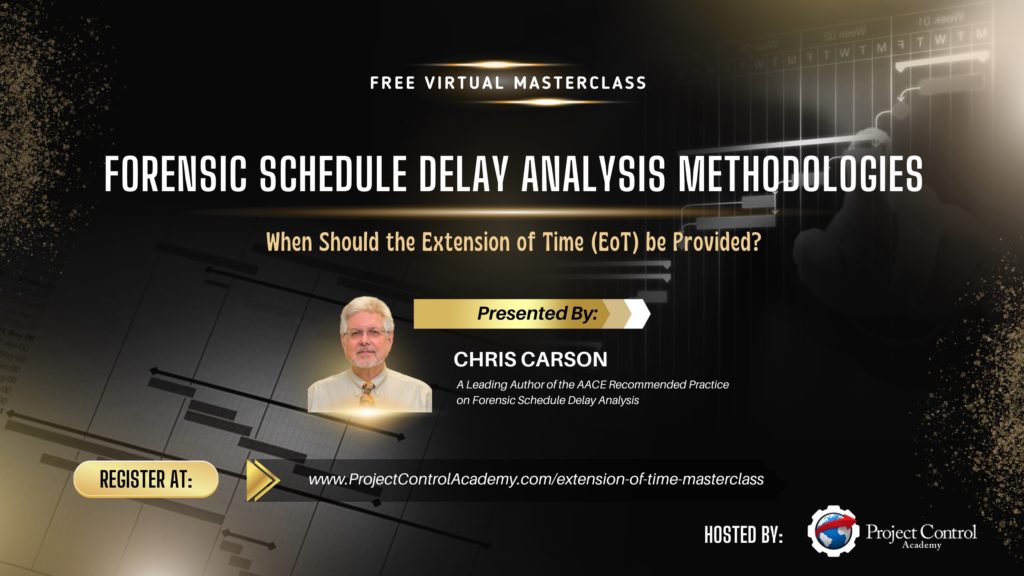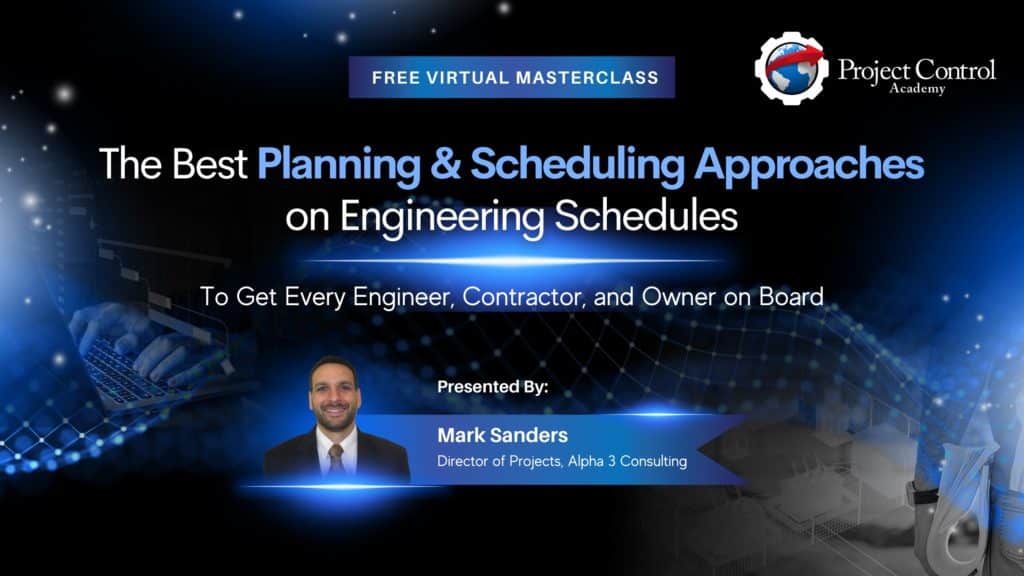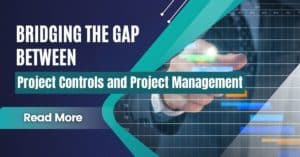Schedule delays are an unfortunate and harsh reality in the world of projects. As project professionals, no matter what we do, it seems that things don’t always go according to plan, and we often end up facing delays in our projects.
You would have dealt with project delays at some point in your career. This is no surprise since there are so many uncertainties and realities on the ground that keep changing.
Things have especially gone wary with Covid and supply chain disruptions worldwide. These factors continue to create a ripple effect even today, and projects are facing more unprecedented delays than ever before.
With delays mounting, Extension of Time (EOT) Claims and disputes have become the new normal for projects worldwide. To prepare EOT claims, you must analyze delay events and employ suitable methodologies to create a well-drafted claim. Unfortunately, most planners and schedulers lack knowledge of recommended practices and delay analysis methodologies, leading to rejected claims, often ending in disputes.
In fact, as per the Arcadis Disputes Report 2022, the #1 cause for disputes was “Poorly drafted or incomplete and unsubstantiated claims.”
This is where Forensic Planners and Delay Analysts come into the picture. Organizations call on the support of these experts to tackle claims and perform schedule delay analyses to quantify and determine the extent of the claim and help resolve them.
Needless to say, the demand for forensic planners and delay analysts has exploded over the years!
The forensic delay analysis career opportunities are endless, but the number of project control professionals pursuing this field remains low despite the demand. This is primarily due to a lack of awareness of the field and the growth opportunities a forensic delay analysis career offers.
Are you interested in exploring a forensic delay analysis career but confused about how to go about it?
Maybe you are not looking to change careers but would like to expand your skillsets and equip yourself with knowledge of delay analysis to add further value to your projects, but you don’t know how.
If you fit into either of the categories above, you definitely should continue reading this blog or watch the video below for the correct guidance!
We had Chris Carson, a leading authority and forensic schedule delay analysis expert and one of the primary authors of AACE International’s Forensic Delay Analysis Recommended Practice join us in a recent LinkedIn Live session exploring this topic. He shared several fantastic insights into this field and the steps you need to take to equip yourselves with the skills and knowledge in forensic planning and delay analysis.
So let’s dive right in and learn more about the Forensic Delay Analysis career path and its future outlook in much more detail and see what it holds for you.
What is Forensic Analysis?
Forensic means determining something that happened in the past. Forensic analysis in the world of construction is reviewing and analyzing past project performance, including contracts, schedules, and costs, not just delays.
According to Chris, the truth is whether you are a project controls professional or project manager; you may already be involved in some form of forensic analysis to some degree.
Imagine you are the project manager, and there is a time and material change order or some other impact that you have to analyze and provide a review of what happened. If the delay and costs have already been absorbed into the project, you are doing forensic analysis right there!
Or imagine a situation where the owner requested you as the contractor to execute a particular work without proper scope definition and pricing. After completing the job, you would have to raise an invoice which would include the actual costs of doing the work rather than the estimate. To do this, you would attach several supporting documents, including time sheets, daily reports, and equipment data. All this information is a form of forensic analysis.
So, can you bring an example of a forensic analysis you’ve done?
Now with the understanding of forensic analysis, the question is what, then, is Forensic Schedule Delay Analysis?
What is Forensic Schedule Delay Analysis?
Forensic Delay Analysis is analyzing those delay events already absorbed into the project schedule, and this is not just in instances where you have to prepare a claim. Even reviewing the as-built schedule and analyzing the absorbed delays in the updated project schedule that you prepare at the end of each month would constitute forensic delay analysis.
So even as a planner and scheduler, you perform forensic schedule delay analysis without realizing that!
Also, it’s essential not to confuse delays with disruption. Delay is all about what got done, whereas disruption is all about how much it costs to get it done and how efficient it is.
When performing Forensic Delay Analysis, you would start by identifying those activities that got delayed against planned. And once you have identified the delayed activities, you have to identify the delay driver, which would almost always be related to performance, for example, a start delay or a production delay. However, the factors that drove the performance to cause a delay could be a disruption.
Apart from all this, Forensic Delay Analysis also covers the whole spectrum of analyzing damages, researching, and writing an expert report and a testimony of that report.
To learn more about Forensic Delay Analysis, check the frequently asked questions on the topic here.
Forensic Delay Analysis Career Opportunities
The demand for professionals and experts in the field of Forensic Delay Analysis is increasing more than ever before.
Typically, the onus has been on the contractor to deal with inflation and supply chain-related issues since they are best equipped to absorb such risks. But considering the current state of the economy along with the unprecedented high inflationary environment, cost escalations, and issues due to Covid and supply chain disruptions, the costs of delays are so significant that it wouldn’t be fair to expect contractors to take the whole burden of these delays.
Even in the post-covid world, contractors find it a massive challenge to factor in all the risks surrounding costs and the supply chain. While there might be no scope for contractors to leverage the contract and claim money for supply chain or cost escalation issues, more and more owners choose to share the risks from a fairness standpoint, and to do that, they seek help from Forensic Delay Analysts.
Even before Covid, forensic delay analysis career opportunities have always been great since most projects are inherently delayed.
According to the disputes report from Arcadis, the primary causes for delays and disputes are lack of scope definition, not understanding or complying with contractual obligations, force majeure events, owner-directed changes, and unforeseen events. All of these factors result in project delays. Forensic delay analysts’ job is to determine what happened in the project and identify the responsible party for the delay.
Chris believes that there is an even more incredible forensic delay analysis career opportunities for those working as schedule reviewers. This is identifying current delays, determining who is responsible, and then finding ways to mitigate those delays and complete the project as per the contractual finish date.
Forensic Delay Analysis Career- Barriers to Entry
Chris thinks the number one reason for the low number of project professionals pursuing this field is the lack of understanding and education around forensic delay analysis. Most project professionals don’t know the proper methodologies to be used, recommended practices, and strategies required to prepare a solid claim.
Extension of Time (EOT) claims submitted by contractors for absorbed delays are often poorly drafted, and the analysis doesn’t follow any methodologies or recommended practices. Often, the contractor fails to quantify the correct number of days and requests for less than what they could actually claim for an extension. In such situations, the owner or the owner representative outright rejects the claim rather than guiding the contractor on the right way to present the claim. This creates an endless loop where the contractor keeps making poorly drafted claims.
Preparing a claim is both an art and a science. To develop a claim, you might go with the expectation of finding all the first-hand historical information about the project that you need, but that’s rarely the case. It all starts with the ability to write a good report about what happened, which led to this claim. Understanding the different types of forensic delay analysis methodologies and the various supporting documents and data that you require for properly performing forensic analysis is essential.
The forensic delay analysis, if not done right, could further lead you to formal dispute resolution. In such instances, the need for a well-drafted report that follows the proper methodologies cannot be stressed enough since you must cover your bases and protect yourself and your organization from litigation.
If you are interested in easing your entry into Forensic Schedule Delay Analysis and starting a career in this field, check out this comprehensive training program.
Now let’s assess what else you need to have to start a forensic delay analysis career.
Starting a Forensic Delay Analysis Career
The first step to a Forensic Delay Analysis career is going back and creating a resume by identifying and listing all the tasks you have undertaken related to this field over the years. And as mentioned before, as a project professional in any role, you would have already worked on Forensic Delay Analysis without realizing it.
Check out this on-demand masterclass to explore how you can write Project Controls resumes that stand out and get you hired.
Another important stepping stone is getting educated and certified in scheduling since that is the starting point for good delay analysis. Certifications like the PSP offered by AACE help you gain knowledge and get recognized for your skills in technical scheduling.
Education in forensic delay analysis is also an important aspect. The forensic delay analysis online training by Project Control Academy is an excellent way to gain knowledge about standard methodologies and learn fantastic tips and strategies as you foray into this field.
You also should check out the forensic delay analysis recommended practices from AACE International.
By joining organizations like AACE International, you will get first-hand experience contributing to the industry’s best practices and have the opportunity to talk and get mentored by experts.
Also, if you would like to establish yourself as an expert as your career progresses, you must contribute to the field through peer-reviewed published articles and play an active role in authoring or contributing towards establishing industry best practices.
Training Programs in Forensic Delay Analysis
If you are passionate about pursuing a Forensic Delay Analysis career, you must ensure that you educate yourself. As you learn, you keep adding different skills and knowledge to your arsenal, which will significantly help your career and enhance your expertise in forensic schedule delay analysis.
Getting yourself updated through continuous learning initiatives is essential. However, if you are trying to get your foot through the door into the world of forensic delay analysis and want to learn everything about it, then it’s better to be formally trained rather than getting disseminated pieces of information from several sources.
The comprehensive training program offered by Project Control Academy in forensic schedule delay analysis conducted by Chris Carson himself is a great way to start learning and kick start a Forensic Delay Analysis career.
In this training program, Chris shares his wisdom and insights from over 40 years of experience in the field and gives you access to the entire body of knowledge that you would need to step into the world of forensic delay analysis. The course starts with information about time-related delays and then walks you through building your knowledge in recommended practices and methodologies. It also covers expert reports and testimonies and gives you the tools, tips, and strategies you need to present your claim in the best way possible. Apart from that, you also get access to the student’s forum where you can ask questions and live quarterly sessions where Chris shares valuable information and insights and answers your questions.
Check out more details about this comprehensive training program in Forensic Delay Analysis here.
Forensic Delay Analysis Career Path and Future Growth
The usual forensic delay analysis career path starts with scheduling.
If you are working as a planner/scheduler, you are already on the right path to pursuing a career in this field because you already would be performing some form of forensic analysis regularly on the schedule.
If you are interested in kick-starting a career in this field, your first step would be to revise your resume and identify the tasks you might already be performing related to forensic analysis. You also need to go through a formal training in forensic delay analysis, which will help enhance your skillsets in forensic schedule delay analysis.
To grow in this career and be recognized as an expert, you must gain experience on-site. This will help you understand how things work in the field and gain many insights that will help you be recognized as an expert, especially in litigation.
To keep growing in the field, you need career wins as a forensic delay analyst. It’s necessary to keep honing your skills and ensure that you are following recommended practices and methodologies as you move up in your career.
Summary
Forensic Schedule Delay Analysis is all about analyzing delay events that have already been absorbed into the project schedule and cover the whole spectrum of analyzing damages, researching, and writing an expert report and a testimony of that report.
A career in Forensic Delay Analysis is promising and fun. With projects being delayed worldwide, there are many growth opportunities in the field. Add to that the complexities due to Covid, cost escalations, and supply chain disruptions, the demand for professionals in this field is increasing more than ever before.
As a project professional, you may already be involved in forensic analysis to some extent, and that is especially true if you are a planner or a scheduler.
To kick start a career in this promising field, you need to identify those tasks that you are already performing related to forensic analysis and tweak your resume accordingly. Also, joining professional organizations like AACE and learning recommended best practices and methodologies is highly recommended. Certifications like PSP from AACE also help you to get recognized as an expert in technical scheduling and will help you get a foothold in the industry.
Getting trained in Forensic Delay Analysis is a great way to start learning recommended practices and methodologies to enter this field.
To make an impact and get recognized as an expert, it’s also necessary to have the site experience.
Finally, contribute to peer-reviewed publications and new recommended practices as you grow in this field.
We hope this post inspired you to kickstart a forensic delay analysis career. We look forward to supporting you in your career as you step into the world of forensic delay analysis.
Resources
[1] Chris Carson.”Live Steam- Forensic Delay Analysis Career & Future Outlook”. Project Control Academy, 24 August 2022
[ 2] Chris Carson. “Forensic Schedule Delay Analysis FAQs”. Project Control Academy, 19 Nov 2017.
[3] Chris Carson. “Forensic Schedule Delay Analysis Online Training”. Project Control Academy
[4] Chris Carson. “Masterclass- How to write Project Controls resumes that stand out and get you hired”. Project Control Academy
[5] Dr. Nour Bouhou.”How to Choose the Best Forensic Schedule Delay Analysis Methodology”. Project Control Summit 2022
[6] Shohreh Ghorbani. “Certifications in Project Planning/ Scheduling”. Project Control Academy, 20 Aug 2017
[7] Chris Carson, “Top 10 Tips from A Leading Thought Leader In Project Controls”. Project Control Academy
About the Writer & Editor, Joel Jacob

Joel Jacob is the Business Development Manager at Project Control Academy.
Joel has worked across diverse roles in project management, including PMO, project controls, and the customer experience in Kuwait and India. He holds a postgraduate degree in Construction Management and a bachelor’s degree in Civil Engineering.
Joel is also a certified Project Management Professional (PMP) recognized by the Project Management Institute (PMI) and an accredited LEED Green Associate.
His true passion is driving people to achieve the best in their careers.
Connect with Joel via LinkedIn
About the Forensic Delay Analysis Thought Leader, Chris Carson

Chris Carson is a recognized thought leader in industry associations including CMAA, AACE International, RICS, PMI, and the Guild of Project Controls. He has presented over 700 industry sessions, authored or contributed to over 25 publications, and received multiple awards, such as the 2011 AACE International “Technical Excellence” award, the 2009 PMI College of Scheduling award for “Significant Contributions to the Scheduling Industry,” and the “Chairman’s Award” from CMAA in 2006 for contributions to the CM industry.
Chris Carson is the author of several industry best practices and guidelines such as PMI “CPM Scheduling For Construction” and AACE International Recommended Practice No. 29R-03, Forensic Schedule Analsyis.






![[Free 90-min Masterclass] The Ultimate Leadership Recipe for Project Professionals](https://www.projectcontrolacademy.com/wp-content/uploads/2024/08/4-1024x576.jpg)















